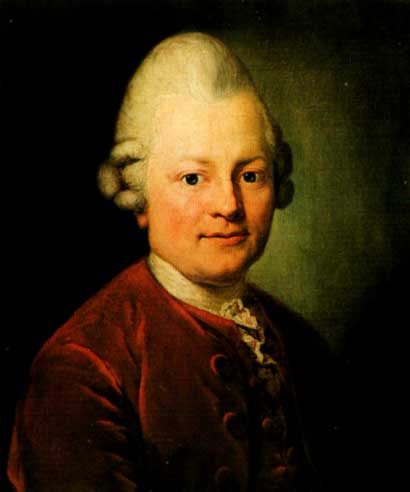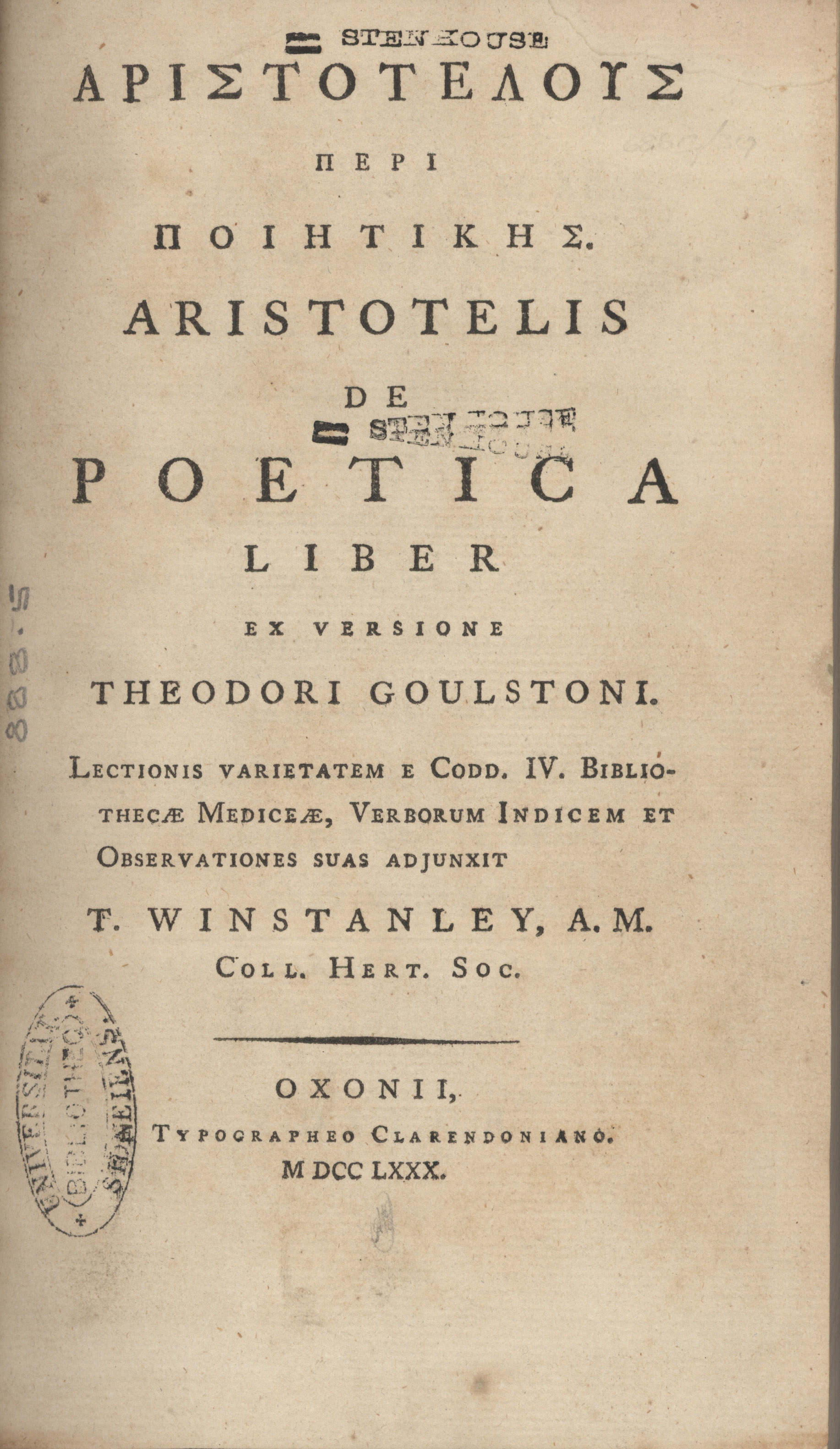|
Dramaturges
A dramaturge or dramaturg (from Ancient Greek δραματουργός – dramatourgós) is a literary adviser or editor in a theatre, opera, or film company who researches, selects, adapts, edits, and interprets scripts, libretti, texts, and printed programmes (or helps others with these tasks), consults authors, and does public relations work. Its modern-day function was originated by the innovations of Gotthold Ephraim Lessing, an 18th-century German playwright, philosopher, and dramatic theory, theatre theorist. Responsibilities One of the dramaturge's contributions is to categorise and discuss the various types of plays or operas, their interconnectedness and their styles. The responsibilities of a dramaturge vary from one theatre or opera company to the next. They might include the hiring of actors, the development of a season of plays or operas with a sense of coherence among them, assistance with and editing of new plays or operas by resident or guest playwrights or compo ... [...More Info...] [...Related Items...] OR: [Wikipedia] [Google] [Baidu] |
Hamburg National Theatre
The Hamburg Enterprise (), commonly known as the Hamburg National Theatre, was a theatre company in Hamburg (now Germany), that existed 1767–1769 at the Gänsemarkt square, and that was led by Abel Seyler. It was the first attempt to establish a national theatre in Germany. It was modelled after Det Kongelige Teater, founded by Ludvig Holberg in Denmark in 1748. Its leading actor was Konrad Ekhof and the theatre employed Gotthold Ephraim Lessing as the world's first dramaturg; Lessing's influential ''Hamburg Dramaturgy'', based on his work at the Hamburg National Theatre, defined the new field of dramaturgy and also introduced the term.Luckhurst, Mary (2006). ''Dramaturgy: A Revolution in Theatre''. Cambridge: Cambridge University Press. p. 24. The theatre premiered Lessing's '' Minna von Barnhelm'' on 30 September 1767. The Hamburg National Theatre was mainly owned and led by the former banker Abel Seyler Abel Seyler (23 August 1730, Liestal – 25 April 1800, Rellingen ... [...More Info...] [...Related Items...] OR: [Wikipedia] [Google] [Baidu] |
Liberal Arts Education
Liberal arts education () is a traditional academic course in Western higher education. ''Liberal arts'' takes the term '' art'' in the sense of a learned skill rather than specifically the fine arts. ''Liberal arts education'' can refer to studies in a liberal arts degree course or to a university education more generally. Such a course of study contrasts with those that are principally vocational, professional, or technical, as well as religiously based courses. The term ''liberal arts'' for an educational curriculum dates back to classical antiquity in the West, but has changed its meaning considerably, mostly expanding it. The seven subjects in the ancient and medieval meaning came to be divided into the trivium of rhetoric, grammar, and logic, and the quadrivium of astronomy, arithmetic, geometry, and music. Since the late 1990s, major universities have gradually dropped the term ''liberal arts'' from their curriculum or created schools for liberal art disciplines to c ... [...More Info...] [...Related Items...] OR: [Wikipedia] [Google] [Baidu] |
Dramaturgy
Dramaturgy is the study of dramatic composition and the representation of the main elements of drama on the stage. The role of a dramaturg in the field of modern dramaturgy is to help realize the multifaceted world of the play for a production using information from the script, playwright, and the context in which the play was written. It is a dramaturg's job to assist the director and sometimes the playwright, especially if the culture of the play is not fully experience by these people. The term first appears in the eponymous work '' Hamburg Dramaturgy'' (1767–69) by Gotthold Ephraim Lessing. Lessing composed this collection of essays on the principles of drama while working as the world's first dramaturge at the Hamburg National Theatre of Abel Seyler. Dramaturgy is distinct from play writing and directing, although the three may be practiced by one individual. Some dramatists combine writing and dramaturgy when creating a drama. Others work with a specialist, called a drama ... [...More Info...] [...Related Items...] OR: [Wikipedia] [Google] [Baidu] |
American Theatre (magazine)
Theatre Communications Group (TCG) is a non-profit service organization headquartered in New York City that promotes professional non-profit theatre in the United States. The organization also publishes ''American Theatre'' magazine and ''ARTSEARCH'', a theatrical employment bulletin, as well as trade editions of theatrical scripts. History Theatre Communications Group was established in 1961 with a grant from the Ford Foundation in response to their then arts and humanities director W. McNeil Lowry's desire to foster communication and cooperation among the growing community of regional theatres throughout the country.Schanke p. 188 Though initially run as a Ford Foundation administered program, TCG independently incorporated in 1964. The organization began with a membership of 15 regional and community theatres, and nine university drama departments under the leadership of Pat Brown. In its first decade of operation, other leaders included Michael Mabry, Joseph Zeigler a ... [...More Info...] [...Related Items...] OR: [Wikipedia] [Google] [Baidu] |
The New York Times
''The New York Times'' (''NYT'') is an American daily newspaper based in New York City. ''The New York Times'' covers domestic, national, and international news, and publishes opinion pieces, investigative reports, and reviews. As one of the longest-running newspapers in the United States, the ''Times'' serves as one of the country's Newspaper of record, newspapers of record. , ''The New York Times'' had 9.13 million total and 8.83 million online subscribers, both by significant margins the List of newspapers in the United States, highest numbers for any newspaper in the United States; the total also included 296,330 print subscribers, making the ''Times'' the second-largest newspaper by print circulation in the United States, following ''The Wall Street Journal'', also based in New York City. ''The New York Times'' is published by the New York Times Company; since 1896, the company has been chaired by the Ochs-Sulzberger family, whose current chairman and the paper's publ ... [...More Info...] [...Related Items...] OR: [Wikipedia] [Google] [Baidu] |
Internet Archive
The Internet Archive is an American 501(c)(3) organization, non-profit organization founded in 1996 by Brewster Kahle that runs a digital library website, archive.org. It provides free access to collections of digitized media including websites, Application software, software applications, music, audiovisual, and print materials. The Archive also advocates a Information wants to be free, free and open Internet. Its mission is committing to provide "universal access to all knowledge". The Internet Archive allows the public to upload and download digital material to its data cluster, but the bulk of its data is collected automatically by its web crawlers, which work to preserve as much of the public web as possible. Its web archiving, web archive, the Wayback Machine, contains hundreds of billions of web captures. The Archive also oversees numerous Internet Archive#Book collections, book digitization projects, collectively one of the world's largest book digitization efforts. ... [...More Info...] [...Related Items...] OR: [Wikipedia] [Google] [Baidu] |
Gotthold Lessing
Gotthold Ephraim Lessing (; ; 22 January 1729 – 15 February 1781) was a German philosopher, dramatist, publicist and art critic, and a representative of the Enlightenment era. His plays and theoretical writings substantially influenced the development of German literature. He is widely considered by theatre historians to be the first dramaturg in his role at Abel Seyler's Hamburg National Theatre. The word Dramaturgy first appears in his work ''Hamburg Dramaturgy.'' Life Lessing was born in Kamenz, a small town in Saxony, to pastor and theologian (1693–1770) and his wife Justine Salome Feller (1703–1777), daughter of pastor of Kamenz, Gottfried Feller (1674–1733). His father was a Lutheran minister and wrote on theology. Young Lessing studied at the Latin School in Kamenz from 1737 to 1741. With a father who wanted his son to follow in his footsteps, Lessing next attended the Fürstenschule St. Afra in Meissen. After completing his education at St. Afra's, he enrolled ... [...More Info...] [...Related Items...] OR: [Wikipedia] [Google] [Baidu] |
Hamburg Dramaturgy
The ''Hamburg Dramaturgy'' () is a highly influential work on drama by Gotthold Ephraim Lessing, written between 1767 and 1769 when he worked as a dramaturg for Abel Seyler's Hamburg National Theatre. It was not originally conceived as a unified and systematical book, but rather as series of essays on the theater, which Lessing wrote as commentary on the plays of the short-lived Hamburg National Theater. This collection of 101 short essays represents one of the first sustained critical engagements with the potential of theater as a vehicle for the advancement of humanistic discourse. In many ways, the ''Hamburg Dramaturgy'' defined the new field of dramaturgy, and also introduced the term. During the time Lessing wrote the ''Hamburg Dramaturgy,'' there was a new movement of German theatre, based on self-reflection. Actors were beginning to perform the inner and outer lives of their characters at the same time. One of Lessing's most famous and renowned quotes from the compilation ... [...More Info...] [...Related Items...] OR: [Wikipedia] [Google] [Baidu] |
Theatre
Theatre or theater is a collaborative form of performing art that uses live performers, usually actors to present experiences of a real or imagined event before a live audience in a specific place, often a Stage (theatre), stage. The performers may communicate this experience to the audience through combinations of gesture, speech, song, music, and dance. It is the oldest form of drama, though live theatre has now been joined by modern recorded forms. Elements of art, such as painted scenery and stagecraft such as lighting are used to enhance the physicality, presence and immediacy of the experience. Places, normally buildings, where performances regularly take place are also called "theatres" (or "theaters"), as derived from the Ancient Greek θέατρον (théatron, "a place for viewing"), itself from θεάομαι (theáomai, "to see", "to watch", "to observe"). Modern Western theatre comes, in large measure, from the theatre of ancient Greece, from which it borrows tec ... [...More Info...] [...Related Items...] OR: [Wikipedia] [Google] [Baidu] |
Opera
Opera is a form of History of theatre#European theatre, Western theatre in which music is a fundamental component and dramatic roles are taken by Singing, singers. Such a "work" (the literal translation of the Italian word "opera") is typically a collaboration between a composer and a libretto, librettist and incorporates a number of the performing arts, such as acting, Theatrical scenery, scenery, costume, and sometimes dance or ballet. The performance is typically given in an opera house, accompanied by an orchestra or smaller musical ensemble, which since the early 19th century has been led by a conducting, conductor. Although musical theatre is closely related to opera, the two are considered to be distinct from one another. Opera is a key part of Western culture#Music, Western classical music, and Italian tradition in particular. Originally understood as an sung-through, entirely sung piece, in contrast to a play with songs, opera has come to include :Opera genres, numerous ... [...More Info...] [...Related Items...] OR: [Wikipedia] [Google] [Baidu] |
Dramatic Theory
Dramatic theory attempts to form theories about theatre and drama. Drama is defined as a form of art in which a written play is used as basis for a performance. Dramatic theory is studied as part of theatre studies. Drama creates a sensory impression in its viewers during the performance. This is the main difference from both poetry and epics, which evoke imagination in the reader. Dramatic theory was already discussed in the Antiquities p.e. by Aristotle (Poetics (Aristotle), ''Poetics'') in Ancient Greek and Bharata Muni (''Natyasastra'') in Ancient India. Some tried to systematize existent plays based on common traits or to justify them compared to other types of plays. Others created schemes for future plays for them to accomplish political or ethical aims or simply as a guide to create good plays. Modern dramatic theory is based on the idea that drama is a plurimedial form of art. Therefore, a drama cannot be completely comprehended from the text alone. Understanding requir ... [...More Info...] [...Related Items...] OR: [Wikipedia] [Google] [Baidu] |





